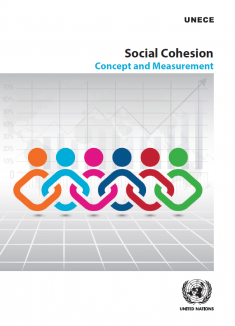Social cohesion, broadly speaking, is the ‘glue’ that binds society together.
Societies with higher levels of social cohesion are healthier, more resilient to external shocks, and experience greater economic growth. An understanding of social cohesion helps us make sense of a wide range of topics including globalization, ethnic and group fragmentation, inequalities and barriers to social mobility.
Yet pinning down exactly what social cohesion means can be challenging. It’s not something that can be directly observed or measured, and encapsulates a whole host of different dimensions, which can be overly broad and all-encompassing if not adequately defined through a set of relevant dimensions and levels of analysis.
This publication reviews the ways in which social cohesion has been operationalized by statistical organizations, examining the definitions and concepts involved in its measurement. It covers ongoing debates on defining social cohesion and its multi-dimensional nature and outlines key dimensions of interest that can offer insights into the social conduct of individuals or groups within a population such as confidence in institutions, trust in others, a sense of belonging, shared values, social connections, participation, and socio-economic inequality and social mobility.
The publication focuses on the ways in which national statistical offices can measure social cohesion, including by linking data from different surveys. It offers approaches to facilitate a coherent dissemination of results. The potential of ‘alternative’, non-survey data sources is also discussed as a possible route to diversify and improve the measurement of social cohesion.
The publication is designed principally for national statistical offices and may also be valuable for policymakers, researchers and others interested in measuring developments in society.
